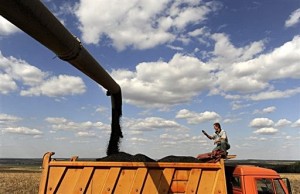Agence France-Presse | 12 October 2009
By Eleonore Dermy (AFP)
OSTROGOZHSK, Russia — For years, foreign investors have been attracted by the gleam of Russia's vast reserves of crude oil.
But deep in the quiet, rolling landscapes of southwest Russia, it is not the seductive power of black gold that has brought foreign money into the country.
It is the more mundane appeal of black earth, millions of hectares of ultra-fertile agricultural land that foreign companies hope will provide the ideal answer to the world's changing food needs.
Swedish company Black Earth Farming (BEF) since 2006 has bought 300,000 hectares (740,000 acres) of Russian farmland after the government finally allowed land to be privatised after decades of state ownership.
"In Europe the price of land is very high," BEF chief executive Sture Gustavsson said as he surveyed the newly acquired lands in the Voronezh region some 600 kilometres south of Moscow.
In Russia, a hectare of land can still be acquired for several hundred dollars.
"It is a great challenge. But we are loving it," Gustavsson said.
Russia has tens of millions of hectares (acres) of chernozem, or black earth, considered a dream soil because of its richness in humus, which is formed by the decomposition of plant matter by micro-organisms.
The high humus content gives the soil an ability to retain moisture that makes it perfect for farming. The famous Black Earth region of Russia and Ukraine covers an area approximately half the size of Germany.
Yet while Russia has become one of the world's main grain exporters, the full potential of its vast agricultural lands remains unfulfilled, with vast tracts of arable land going fallow after the collapse of the Soviet Union.
As a result, the modern techniques that foreign firms can bring to the most traditional of industries are essential if Russia is to fully realise its potential.
"The foreigners have brought us innovative technologies and jobs," said the head of BEF's local subsidiary Agro-Invest Ostrogozhsk, Alexander Averyanov.
"When we arrived in 2006, just 30 percent of the land in the region was being cultivated while 70 percent had been fallow for five, seven, even 12 years," he added.
"We have worked for two-and-a-half years and now we have been able to start cultivation."
Other investors in Russian agricultural land have ranged from investment funds to foreign governments.
In April 2009, South Korean shipbuilder Hyundai Heavy Industries took a majority stake in Khorol Zerno, a firm which owns 10,000 hectares of farmland in Russia's Far East.
"The world needs grain more and more," said Dmitry Katalevsky, a financial analyst with Deloitte, pointing to a shift in Asian diets towards wheat, the development of bio-fuels and the rising global population.
"The surge in agriculture prices has prompted investors to become more interested in these goods, when before they had invested more in oil, metals and gas."
Russia has set ambitious targets to fulfill the export potential of its agriculture industry.
Agriculture Minister Elena Skrinnik has said Russia could raise its annual grain production to 120 million tonnes in the next 10-15 years, allowing it to roughly double its exports to 50 million tonnes annually.
This year the total grain harvest is expected to be 90 million tonnes, down from last year's bumper figure of 108 million.
Gustavsson admitted that the challenges remain enormous as the yield from the land being cultivated by BEF remains relatively weak and it will take years of investment to harvest the full benefits of the company's investment.
Meanwhile the price of grain has fallen after a spike in 2007 and foreign investors still have to cope with the hurdles of Russia's notorious bureaucracy.
And because of the lack of rural infrastructure -- a major problem for the Russian agriculture industry -- BEF is this year spending tens of millions of dollars on new silos to keep the grain harvests.
Such investment can only be welcome for Russia and President Dmitry Medvedev admitted last week that billions of dollars of investment were needed to expand storage facilities that currently hold only 30 percent of the harvest.
"Over the past 10 years we have understood that agriculture is not a black hole where money is lost and brings nothing for the state," Medvedev said.













